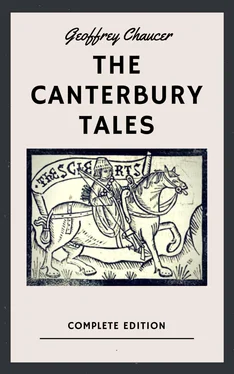That is to say, that telleth in this case
Tales of best sentence and most solace,
Shall have a supper *at your aller cost* *at the cost of you all*
Here in this place, sitting by this post,
When that ye come again from Canterbury.
And for to make you the more merry,
I will myselfe gladly with you ride,
Right at mine owen cost, and be your guide.
And whoso will my judgement withsay,
Shall pay for all we spenden by the way.
And if ye vouchesafe that it be so,
Tell me anon withoute wordes mo'*, *more
And I will early shape me therefore."
This thing was granted, and our oath we swore
With full glad heart, and prayed him also,
That he would vouchesafe for to do so,
And that he woulde be our governour,
And of our tales judge and reportour,
And set a supper at a certain price;
And we will ruled be at his device,
In high and low: and thus by one assent,
We be accorded to his judgement.
And thereupon the wine was fet* anon. *fetched.
We drunken, and to reste went each one,
Withouten any longer tarrying
A-morrow, when the day began to spring,
Up rose our host, and was *our aller cock*, *the cock to wake us all*
And gather'd us together in a flock,
And forth we ridden all a little space,
Unto the watering of Saint Thomas<62>:
And there our host began his horse arrest,
And saide; "Lordes, hearken if you lest.
Ye *weet your forword,* and I it record. *know your promise*
If even-song and morning-song accord,
Let see now who shall telle the first tale.
As ever may I drinke wine or ale,
Whoso is rebel to my judgement,
Shall pay for all that by the way is spent.
Now draw ye cuts*, ere that ye farther twin**. *lots **go
He which that hath the shortest shall begin."
"Sir Knight (quoth he), my master and my lord,
Now draw the cut, for that is mine accord.
Come near (quoth he), my Lady Prioress,
And ye, Sir Clerk, let be your shamefastness,
Nor study not: lay hand to, every man."
Anon to drawen every wight began,
And shortly for to tellen as it was,
Were it by a venture, or sort*, or cas**, *lot **chance
The sooth is this, the cut fell to the Knight,
Of which full blithe and glad was every wight;
And tell he must his tale as was reason,
By forword, and by composition,
As ye have heard; what needeth wordes mo'?
And when this good man saw that it was so,
As he that wise was and obedient
To keep his forword by his free assent,
He said; "Sithen* I shall begin this game, *since
Why, welcome be the cut in Godde's name.
Now let us ride, and hearken what I say."
And with that word we ridden forth our way;
And he began with right a merry cheer
His tale anon, and said as ye shall hear.
Notes to the Prologue
1. Tyrwhitt points out that "the Bull" should be read here, not "the Ram," which would place the time of the pilgrimage in the end of March; whereas, in the Prologue to the Man of Law's Tale, the date is given as the "eight and twenty day of April, that is messenger to May."
2. Dante, in the "Vita Nuova," distinguishes three classes of pilgrims: palmieri - palmers who go beyond sea to the East, and often bring back staves of palm-wood; peregrini, who go the shrine of St Jago in Galicia; Romei, who go to Rome. Sir Walter Scott, however, says that palmers were in the habit of passing from shrine to shrine, living on charity — pilgrims on the other hand, made the journey to any shrine only once, immediately returning to their ordinary avocations. Chaucer uses "palmer" of all pilgrims.
3. "Hallows" survives, in the meaning here given, in All Hallows — All-Saints — day. "Couth," past participle of "conne" to know, exists in "uncouth."
4. The Tabard — the sign of the inn — was a sleeveless coat, worn by heralds. The name of the inn was, some three centuries after Chaucer, changed to the Talbot.
5. In y-fall," "y" is a corruption of the Anglo-Saxon "ge" prefixed to participles of verbs. It is used by Chaucer merely to help the metre In German, "y-fall," or y-falle," would be "gefallen", "y-run," or "y-ronne", would be "geronnen."
6. Alisandre: Alexandria, in Egypt, captured by Pierre de Lusignan, king of Cyprus, in 1365 but abandoned immediately afterwards. Thirteen years before, the same Prince had taken Satalie, the ancient Attalia, in Anatolia, and in 1367 he won Layas, in Armenia, both places named just below.
7. The knight had been placed at the head of the table, above knights of all nations, in Prussia, whither warriors from all countries were wont to repair, to aid the Teutonic Order in their continual conflicts with their heathen neighbours in "Lettowe" or Lithuania (German. "Litthauen"), Russia, &c.
8. Algesiras was taken from the Moorish king of Grenada, in 1344: the Earls of Derby and Salisbury took part in the siege. Belmarie is supposed to have been a Moorish state in Africa; but "Palmyrie" has been suggested as the correct reading. The Great Sea, or the Greek sea, is the Eastern Mediterranean. Tramissene, or Tremessen, is enumerated by Froissart among the Moorish kingdoms in Africa. Palatie, or Palathia, in Anatolia, was a fief held by the Christian knights after the Turkish conquests — the holders paying tribute to the infidel. Our knight had fought with one of those lords against a heathen neighbour.
9. Ilke: same; compare the Scottish phrase "of that ilk," — that is, of the estate which bears the same name as its owner's title.
10. It was the custom for squires of the highest degree to carve at their fathers' tables.
11. Peacock Arrows: Large arrows, with peacocks' feathers.
12. A nut-head: With nut-brown hair; or, round like a nut, the hair being cut short.
13. Grey eyes appear to have been a mark of female beauty in Chaucer's time.
14. "for the mastery" was applied to medicines in the sense of "sovereign" as we now apply it to a remedy.
15. It was fashionable to hang bells on horses' bridles.
16. St. Benedict was the first founder of a spiritual order in the Roman church. Maurus, abbot of Fulda from 822 to 842, did much to re-establish the discipline of the Benedictines on a true Christian basis.
17. Wood: Mad, Scottish "wud". Felix says to Paul, "Too much learning hath made thee mad".
18. Limitour: A friar with licence or privilege to beg, or exercise other functions, within a certain district: as, "the limitour of Holderness".
19. Farme: rent; that is, he paid a premium for his licence to beg.
20. In principio: the first words of Genesis and John, employed in some part of the mass.
21. Lovedays: meetings appointed for friendly settlement of differences; the business was often followed by sports and feasting.
22. He would the sea were kept for any thing: he would for anything that the sea were guarded. "The old subsidy of tonnage and poundage," says Tyrwhitt, "was given to the king 'pour la saufgarde et custodie del mer.' — for the safeguard and keeping of the sea" (12 E. IV. C.3).
23. Middleburg, at the mouth of the Scheldt, in Holland; Orwell, a seaport in Essex.
24. Shields: Crowns, so called from the shields stamped on them; French, "ecu;" Italian, "scudo."
25. Poor scholars at the universities used then to go about begging for money to maintain them and their studies.
26. Parvis: The portico of St. Paul's, which lawyers frequented to meet their clients.
27. St Julian: The patron saint of hospitality, celebrated for supplying his votaries with good lodging and good cheer.
28. Mew: cage. The place behind Whitehall, where the king's hawks were caged was called the Mews.
29. Many a luce in stew: many a pike in his fish-pond; in those Catholic days, when much fish was eaten, no gentleman's mansion was complete without a "stew".
Читать дальше












